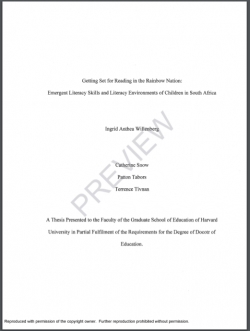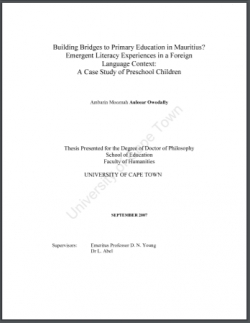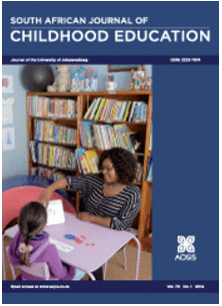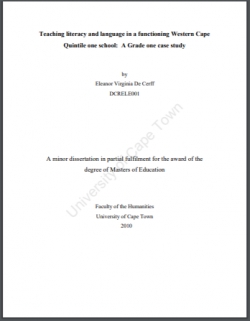Getting set for reading in the rainbow nation: emergent literacy skills and literacy environments of children in South Africa

Type
Thesis
Authors
Category
ECCE, Preschool
[ Browse Items ]
Publication Year
2004
Publisher
URL
[ private ]
Pages
276 leaves
Subject
Early childhood education, Early literacy competencies, Reading, Skills, Assessment, Developing countries, Home, School, Kindergartens, Preschool children, Parents, Teachers, Teacher training, Diverse communities, South Africa
Tags
Abstract
Although there has been considerable research on emergent literacy development in the U.S. and other developed countries, little is known about this phenomenon in the context of developing countries. Thus, the aim of the research was to document emergent literacy competencies as well as home and school literacy environments of 101 kindergarteners from historically disadvantaged communities in Cape Town, South Africa. Data collection included comprehensive assessment of the children's emergent literacy competencies; interviews with parents; teacher questionnaires; and classroom observations. The children displayed a fair repertoire of emergent literacy competencies. They had a good grasp of basic concepts about print but performed more poorly on phonological awareness and language tasks. Their performance suggests that their current skills are adequate to support the acquisition of basic decoding skills but their language deficits may result in later difficulties with reading comprehension. Principal component analysis of the emergent literacy assessment data identified two dimensions of literacy skill, namely Language and Print, and Phonological Awareness. Phonological awareness skills were not found to be associated with family variables. However, children who displayed better language and print skills tended to come from families with a stronger English background, more education and higher incomes. These children also had access to shared book reading experiences at earlier ages and owned more children's books. In general, both the home and school literacy environments offered limited resources and activities for stimulating literacy, enriching vocabulary development and promoting decontextualised language skills. In the South African context, this study has provided valuable documentation of the emergent literacy skills of the children and their developmental niches. The findings suggest a need for specialised pre- and in-service literacy training for teachers; increasing children's access to language and literacy resources at home and school; and collaborative efforts by parents, teachers and librarians to promote children's literacy development more effectively. From a broader perspective, this study contributes by extending the collective knowledge of the field regarding emergent literacy development in diverse contexts.
Description
Thesis (Ed. D.)--Harvard Graduate School of Education, 2004
Number of Copies
1
| Library | Accession No | Call No | Copy No | Edition | Location | Availability |
|---|---|---|---|---|---|---|
| Main | 208 | 1 | Yes |



